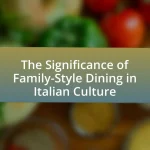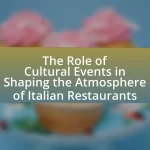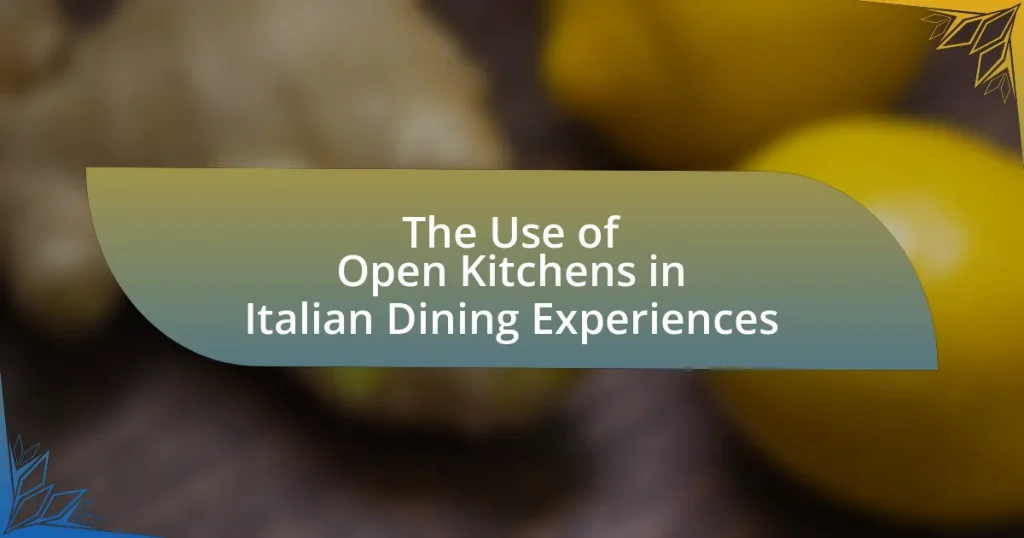Cultural events play a crucial role in shaping the atmosphere of Italian restaurants by enhancing the dining experience through immersive cultural elements such as wine tastings, regional food festivals, and traditional music performances. These events not only create an authentic ambiance that reflects Italy’s culinary heritage but also foster community engagement and social interaction among patrons. The article explores various types of cultural events commonly held in Italian restaurants, their impact on customer engagement and brand identity, and the challenges restaurants face in organizing these events. Additionally, it discusses best practices for successful event planning, marketing strategies, and the importance of cultural authenticity to avoid appropriation.

What is the role of cultural events in shaping the atmosphere of Italian restaurants?
Cultural events play a significant role in shaping the atmosphere of Italian restaurants by enhancing the dining experience through immersive cultural elements. These events, such as wine tastings, regional food festivals, and traditional music performances, create an authentic ambiance that reflects Italy’s rich culinary heritage. For instance, hosting a Sicilian food night can introduce patrons to unique dishes and local wines, fostering a deeper appreciation for Italian culture. Additionally, cultural events often encourage community engagement, drawing in diverse crowds and promoting social interaction, which further enriches the restaurant’s atmosphere. This integration of cultural experiences not only attracts customers but also reinforces the restaurant’s identity as a hub for Italian culture and cuisine.
How do cultural events influence the dining experience in Italian restaurants?
Cultural events significantly enhance the dining experience in Italian restaurants by creating an immersive atmosphere that reflects Italy’s rich traditions and culinary heritage. These events, such as festivals, wine tastings, and regional celebrations, often feature authentic music, decorations, and themed menus that transport diners to Italy. For instance, during the Feast of San Gennaro, restaurants may offer special dishes and live performances, fostering a sense of community and cultural appreciation. This engagement not only attracts customers but also deepens their connection to Italian culture, making the dining experience more memorable and enjoyable.
What types of cultural events are commonly held in Italian restaurants?
Italian restaurants commonly host cultural events such as wine tastings, cooking classes, live music performances, and themed dinner nights. These events enhance the dining experience by immersing guests in Italian culture, showcasing regional cuisines, and promoting social interaction. For instance, wine tastings often feature selections from various Italian vineyards, providing patrons with insights into the country’s rich viticulture. Cooking classes allow participants to learn traditional recipes and techniques, fostering a deeper appreciation for Italian culinary arts. Live music, often featuring genres like opera or traditional folk, creates an inviting atmosphere that reflects Italy’s vibrant cultural heritage.
How do these events reflect Italian culture and traditions?
Cultural events in Italian restaurants reflect Italian culture and traditions by showcasing regional customs, culinary heritage, and communal values. These events often feature traditional music, dance, and food, which are integral to Italy’s diverse cultural landscape. For example, festivals like Carnevale highlight local folklore and historical practices, while regional food events celebrate specific ingredients and cooking techniques unique to areas such as Emilia-Romagna or Sicily. This emphasis on local traditions fosters a sense of community and belonging, aligning with Italy’s strong familial and social ties. Additionally, the celebration of these events in restaurants creates an immersive experience that allows patrons to engage with and appreciate the richness of Italian culture.
Why are cultural events important for Italian restaurants?
Cultural events are important for Italian restaurants because they enhance the dining experience by immersing customers in authentic Italian traditions and customs. These events, such as wine tastings, cooking classes, and regional festivals, create a vibrant atmosphere that attracts patrons seeking not just food, but a cultural experience. Research indicates that restaurants hosting cultural events can see a 20% increase in customer engagement and satisfaction, as these activities foster community connections and promote cultural appreciation. By showcasing Italian heritage through music, art, and cuisine, restaurants can differentiate themselves in a competitive market, ultimately driving customer loyalty and repeat visits.
What impact do cultural events have on customer engagement?
Cultural events significantly enhance customer engagement by creating immersive experiences that resonate with patrons. These events foster a sense of community and connection, encouraging customers to participate actively rather than passively consuming services. For instance, a study by the National Endowment for the Arts found that participation in cultural activities increases social interaction and customer loyalty, leading to repeat visits and positive word-of-mouth. Additionally, cultural events often align with the themes and offerings of Italian restaurants, such as wine tastings or regional cuisine showcases, further deepening customer involvement and satisfaction.
How do cultural events contribute to the restaurant’s brand identity?
Cultural events significantly enhance a restaurant’s brand identity by creating a unique atmosphere that resonates with customers. These events allow restaurants to showcase their cultural heritage, culinary traditions, and community values, which helps differentiate them in a competitive market. For instance, hosting Italian-themed nights featuring traditional music and cuisine can attract patrons seeking an authentic experience, thereby reinforcing the restaurant’s identity as a cultural hub. Research indicates that restaurants that actively engage in cultural events often see increased customer loyalty and brand recognition, as these experiences foster emotional connections with diners.
What challenges do Italian restaurants face when organizing cultural events?
Italian restaurants face several challenges when organizing cultural events, including logistical issues, budget constraints, and audience engagement. Logistical issues arise from coordinating event details such as venue setup, staffing, and scheduling, which can be complex and time-consuming. Budget constraints often limit the scope of events, making it difficult to secure quality performers or materials that enhance the cultural experience. Additionally, engaging the target audience can be challenging, as restaurants must effectively market the event to attract attendees while ensuring that the cultural elements resonate with their clientele. These challenges can hinder the successful execution of events that aim to enrich the restaurant’s atmosphere and promote cultural appreciation.
How can restaurants overcome logistical challenges in event planning?
Restaurants can overcome logistical challenges in event planning by implementing detailed planning and coordination strategies. Effective communication among staff, vendors, and clients ensures that all parties are aligned on expectations and responsibilities. Utilizing event management software can streamline scheduling, resource allocation, and task assignments, reducing the likelihood of errors. Additionally, conducting thorough pre-event walkthroughs allows restaurants to identify potential issues in layout and service flow, enabling proactive solutions. Research indicates that 70% of event planners believe that proper logistics management directly impacts the success of an event, highlighting the importance of these strategies in achieving seamless execution.
What are the financial implications of hosting cultural events?
Hosting cultural events has significant financial implications, including increased revenue through ticket sales, food and beverage sales, and potential sponsorships. For instance, a study by the National Endowment for the Arts found that cultural events can boost local economies by attracting tourists and increasing spending in surrounding businesses. Additionally, hosting such events can enhance brand visibility and customer loyalty, leading to repeat business and long-term financial benefits for Italian restaurants.
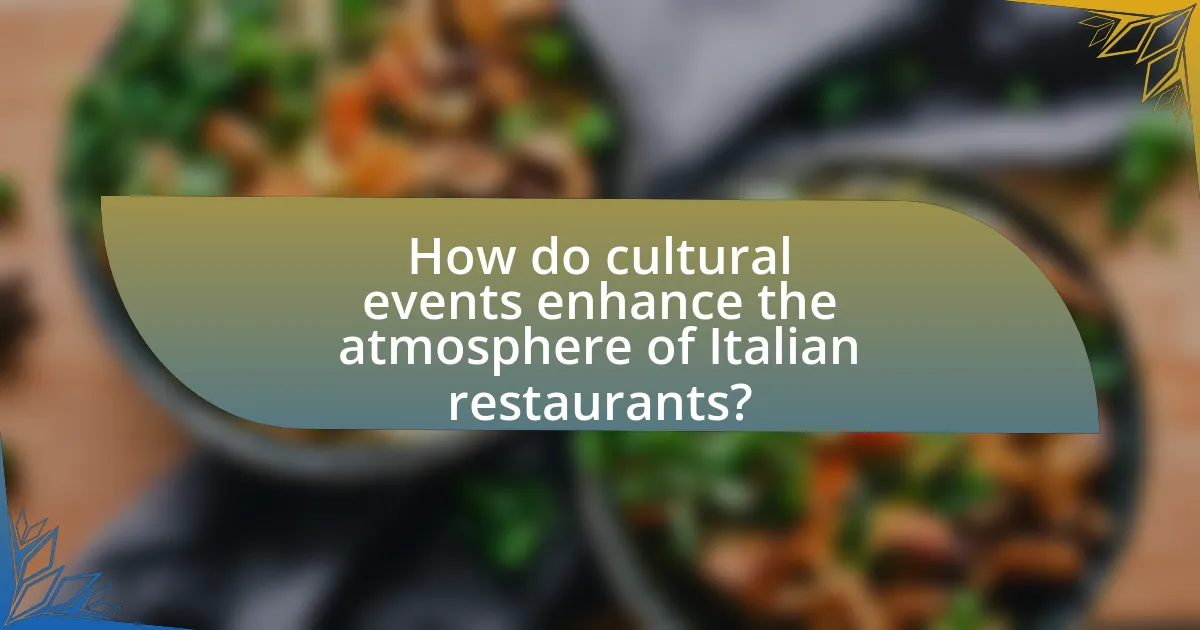
How do cultural events enhance the atmosphere of Italian restaurants?
Cultural events enhance the atmosphere of Italian restaurants by creating an immersive experience that reflects Italy’s rich heritage. These events, such as wine tastings, live music performances, and traditional cooking classes, engage customers and foster a sense of community. For instance, a study by the National Restaurant Association indicates that 70% of diners are more likely to return to a restaurant that offers unique cultural experiences. This engagement not only attracts patrons but also enriches their dining experience, making it memorable and culturally significant.
What sensory experiences do cultural events create for diners?
Cultural events create rich sensory experiences for diners by engaging sight, sound, taste, smell, and touch. For instance, the vibrant colors of traditional Italian decorations and the visual presentation of dishes stimulate sight, while live music or the sounds of a bustling kitchen enhance auditory engagement. The taste of authentic Italian cuisine, often prepared with fresh ingredients, provides a direct connection to cultural heritage. Aromas from herbs and spices, such as basil and garlic, evoke memories and emotions, enriching the dining experience. Additionally, the tactile sensation of handling artisanal bread or the warmth of a shared meal fosters a sense of community. These sensory elements collectively immerse diners in the cultural narrative of Italian cuisine, making the dining experience memorable and authentic.
How does music play a role in the atmosphere during cultural events?
Music significantly enhances the atmosphere during cultural events by creating an emotional connection and setting the mood. In Italian restaurants, for instance, traditional music can evoke feelings of nostalgia and cultural pride, making diners feel more immersed in the experience. Studies show that music influences customer behavior; for example, a study published in the Journal of Consumer Research found that background music can affect the pace of dining and even the amount spent by customers. This demonstrates that music not only enriches the ambiance but also plays a crucial role in shaping the overall dining experience during cultural events.
What culinary elements are highlighted during these events?
Culinary elements highlighted during cultural events in Italian restaurants include traditional dishes, regional ingredients, and cooking techniques. These events often showcase authentic recipes that reflect Italy’s diverse culinary heritage, such as pasta-making demonstrations or regional wine tastings. For instance, during a festival celebrating Sicilian cuisine, dishes like arancini and cannoli may be featured, emphasizing the use of local ingredients like saffron and citrus. This focus on traditional culinary practices not only enhances the dining experience but also educates patrons about Italy’s rich food culture.
How do cultural events foster community engagement in Italian restaurants?
Cultural events foster community engagement in Italian restaurants by creating shared experiences that bring people together. These events, such as wine tastings, cooking classes, and regional festivals, encourage interaction among patrons, enhancing social bonds and a sense of belonging. For instance, a study by the National Restaurant Association found that 70% of diners are more likely to return to a restaurant that hosts community events, indicating that such activities significantly boost customer loyalty and community ties. By celebrating Italian heritage through music, food, and art, these restaurants not only attract diverse audiences but also promote cultural appreciation and understanding within the community.
What role do local partnerships play in enhancing cultural events?
Local partnerships significantly enhance cultural events by providing resources, expertise, and community engagement. These collaborations often involve local businesses, artists, and organizations that contribute to the event’s authenticity and reach. For instance, partnerships with local artists can lead to unique performances that reflect the community’s cultural heritage, while local businesses can offer sponsorships or in-kind donations that reduce costs and increase event visibility. Research shows that events supported by local partnerships tend to attract larger audiences, as they resonate more with community values and interests, thereby fostering a sense of belonging and participation among attendees.
How can cultural events promote cultural exchange among diners?
Cultural events can promote cultural exchange among diners by providing immersive experiences that showcase diverse culinary traditions and practices. These events often feature authentic dishes, traditional music, and dance, allowing diners to engage with different cultures in a meaningful way. For instance, a cultural night at an Italian restaurant may include a regional cuisine showcase, where diners can taste dishes from various Italian regions, learn about their origins, and interact with chefs who share their cultural stories. This direct engagement fosters understanding and appreciation of different cultural backgrounds, enhancing the dining experience and encouraging dialogue among diners.
What feedback do customers provide regarding cultural events in Italian restaurants?
Customers frequently express positive feedback regarding cultural events in Italian restaurants, highlighting their role in enhancing the dining experience. Many patrons appreciate the authentic atmosphere created by live music, traditional dance performances, and themed culinary nights, which contribute to a sense of immersion in Italian culture. For instance, a survey conducted by the National Restaurant Association found that 65% of diners enjoy restaurants that offer cultural events, as these experiences often lead to increased customer satisfaction and repeat visits. Additionally, customers often mention that such events foster a community feel, making the restaurant a social hub for both locals and tourists.
How can restaurants use customer feedback to improve future events?
Restaurants can use customer feedback to enhance future events by systematically collecting and analyzing responses to previous events. This process allows restaurants to identify specific areas for improvement, such as menu offerings, service quality, and event themes. For instance, if feedback indicates that customers enjoyed a particular dish during an event, restaurants can prioritize that dish in future menus. Additionally, analyzing feedback trends can reveal preferences for certain types of cultural experiences, enabling restaurants to tailor their events to better align with customer interests. Research shows that businesses that actively seek and implement customer feedback can see a 10-15% increase in customer satisfaction and loyalty, which directly impacts event attendance and overall success.
What metrics can be used to measure the success of cultural events?
Metrics that can be used to measure the success of cultural events include attendance numbers, participant satisfaction surveys, and revenue generated. Attendance numbers provide a quantitative measure of interest and engagement, while participant satisfaction surveys offer qualitative insights into the experience and impact of the event. Revenue generated serves as a financial indicator of the event’s success and sustainability. For instance, a study by the National Endowment for the Arts found that events with higher attendance and positive feedback significantly contribute to community engagement and economic growth, reinforcing the importance of these metrics in evaluating cultural events.
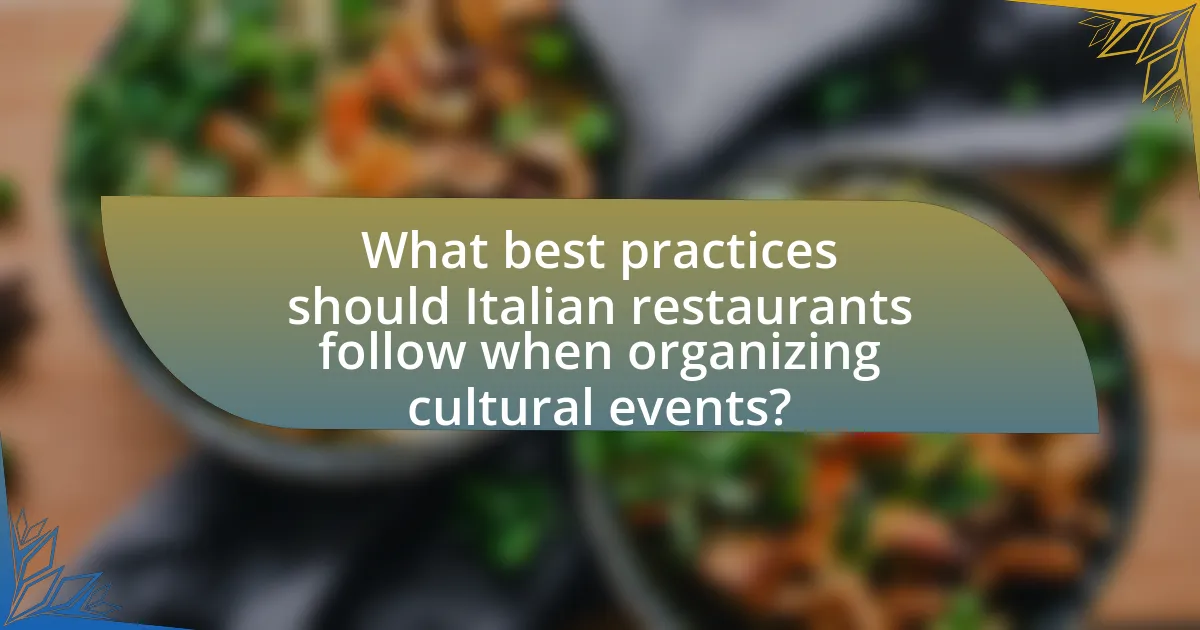
What best practices should Italian restaurants follow when organizing cultural events?
Italian restaurants should prioritize community engagement, authentic cultural representation, and effective marketing when organizing cultural events. Engaging the local community fosters a sense of belonging and encourages participation, which can enhance the restaurant’s reputation and customer loyalty. Authentic cultural representation ensures that the events reflect genuine Italian traditions, which can attract patrons interested in a true cultural experience. Effective marketing strategies, such as social media promotion and partnerships with local organizations, can increase visibility and attendance, ultimately driving sales and enhancing the restaurant’s atmosphere. These practices are supported by the fact that restaurants that actively involve their communities and maintain authenticity often see increased customer satisfaction and repeat business.
How can restaurants effectively market their cultural events?
Restaurants can effectively market their cultural events by leveraging social media platforms, local partnerships, and targeted advertising. Social media allows restaurants to reach a broad audience, showcasing event details through engaging content such as videos and images, which can increase attendance. Collaborating with local businesses or cultural organizations can enhance visibility and credibility, as these partnerships often lead to cross-promotion. Additionally, targeted advertising, particularly through platforms like Facebook and Instagram, enables restaurants to reach specific demographics interested in cultural experiences. According to a study by the National Restaurant Association, 70% of consumers are influenced by social media when deciding where to dine, highlighting the importance of a strong online presence in marketing cultural events.
What channels are most effective for promoting cultural events?
Social media platforms, particularly Facebook and Instagram, are the most effective channels for promoting cultural events. These platforms allow for targeted advertising, enabling event organizers to reach specific demographics interested in cultural experiences. According to a 2021 study by Eventbrite, 80% of event organizers reported that social media was their primary tool for promotion, highlighting its significance in engaging audiences and driving attendance. Additionally, local community websites and email newsletters also serve as effective channels, as they provide direct access to interested local audiences.
How can social media be leveraged to enhance event visibility?
Social media can be leveraged to enhance event visibility by utilizing targeted advertising, engaging content, and influencer partnerships. Targeted advertising allows event organizers to reach specific demographics, increasing the likelihood of attracting attendees who are interested in cultural events. Engaging content, such as live videos, behind-the-scenes posts, and interactive polls, fosters community involvement and excitement around the event. Additionally, collaborating with influencers who resonate with the target audience can amplify reach and credibility, as studies show that 49% of consumers depend on influencer recommendations for their purchasing decisions. These strategies collectively enhance visibility and drive attendance to cultural events in Italian restaurants.
What strategies can be implemented to ensure a successful cultural event?
To ensure a successful cultural event, thorough planning and community engagement are essential. Effective strategies include defining clear objectives, selecting a relevant theme that resonates with the target audience, and collaborating with local artists and cultural organizations to enhance authenticity. Additionally, promoting the event through various channels, such as social media and local press, can increase visibility and attendance. Research indicates that events with strong community involvement tend to attract larger crowds and foster a sense of belonging, which is crucial for cultural events in Italian restaurants. For instance, a study by the National Endowment for the Arts found that community-based cultural events significantly boost local engagement and economic activity.
How can restaurants create a welcoming environment for diverse audiences?
Restaurants can create a welcoming environment for diverse audiences by incorporating inclusive design, diverse menus, and culturally relevant events. Inclusive design involves creating spaces that are accessible to all, including individuals with disabilities, ensuring that seating arrangements and pathways accommodate everyone. Diverse menus that reflect various cultural backgrounds not only cater to different tastes but also show respect for different culinary traditions, enhancing the dining experience for all patrons. Additionally, hosting culturally relevant events, such as festivals or themed nights, fosters community engagement and allows guests to celebrate and learn about different cultures, thereby promoting a sense of belonging. Research indicates that restaurants that embrace diversity in their offerings and atmosphere tend to attract a broader customer base, ultimately leading to increased customer satisfaction and loyalty.
What role does staff training play in the success of cultural events?
Staff training is crucial for the success of cultural events as it equips employees with the necessary skills and knowledge to effectively engage with attendees and deliver a memorable experience. Trained staff can enhance customer service, ensuring that guests feel welcomed and valued, which is essential in creating a positive atmosphere during cultural events. Research indicates that well-trained staff can increase customer satisfaction by up to 30%, directly impacting the overall success of the event. Furthermore, training in cultural awareness allows staff to better represent the themes and values of the event, fostering a deeper connection with the audience and enhancing the authenticity of the experience.
What are some common pitfalls to avoid when hosting cultural events?
Common pitfalls to avoid when hosting cultural events include inadequate planning, lack of cultural sensitivity, and poor marketing strategies. Inadequate planning can lead to logistical issues, such as insufficient seating or resources, which detracts from the event experience. Lack of cultural sensitivity may result in misrepresentation or offense, alienating attendees and damaging the restaurant’s reputation. Poor marketing strategies can lead to low attendance, undermining the event’s purpose and potential impact. According to a study by the National Endowment for the Arts, successful cultural events require thorough preparation and an understanding of the audience’s cultural context to foster engagement and appreciation.
How can restaurants ensure they stay true to cultural authenticity?
Restaurants can ensure they stay true to cultural authenticity by employing traditional recipes and sourcing ingredients that reflect the culture they represent. For instance, Italian restaurants can use locally sourced, high-quality ingredients like San Marzano tomatoes and Parmigiano-Reggiano cheese, which are integral to authentic Italian cuisine. Additionally, hiring chefs who have a deep understanding of the cultural practices and cooking techniques can enhance authenticity. Research indicates that restaurants that prioritize cultural heritage in their menu design and staff training tend to attract customers seeking genuine experiences, thereby reinforcing their commitment to authenticity.
What should be considered to avoid cultural appropriation in events?
To avoid cultural appropriation in events, it is essential to prioritize respect for the culture being represented. This involves engaging with cultural representatives to ensure accurate representation and understanding of their traditions. For instance, collaborating with community members or cultural experts can provide insights that prevent misrepresentation. Additionally, acknowledging the origins of cultural elements used in the event, such as music, food, or attire, fosters respect and appreciation rather than exploitation. Research indicates that events that incorporate authentic cultural practices and engage with the community can enhance the experience while honoring the culture, as seen in successful multicultural festivals that celebrate diversity without appropriation.


